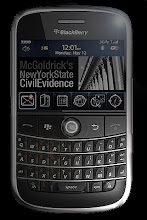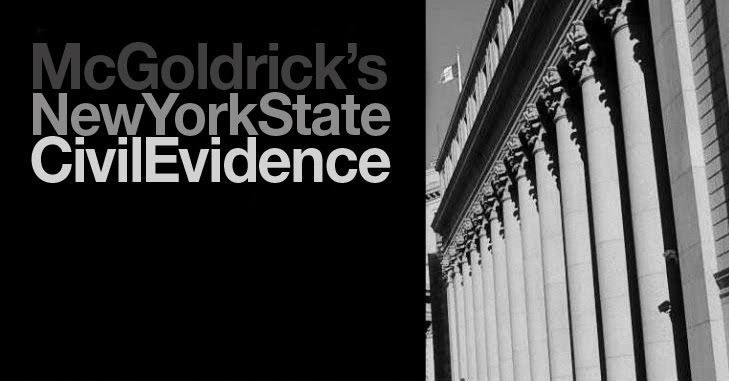The First Department confirmed that the excited utterance exception to the rule against hearsay was not available in a matter where the decedent reported her fall to the plaintiff daughter by telephone some two and a half hours after her fall in Soto v Assisted Care Home Attendants Program 2009 NY Slip Op 07461
The defendant's summary judgment motion to dismiss was granted at trial and affirmed on appeal. Critically, the decedent was conscious after her fall and had time to reflect on her statement before speaking with the witness.
"Plaintiff sued for injuries sustained by decedent when she fell out of bed due to the alleged negligence of her home health aide. Defendants were entitled to judgment when they established, through plaintiff's own deposition testimony, that plaintiff had no personal knowledge of the facts related to the injury (see Rodriguez v Sixth President, 4 AD3d 406 [2004]), thus relegating her theory to being proven only by speculation (see Teplitskaya v 3096 Owners Corp., 289 AD2d 477 [2001]).
In any event, plaintiff's testimony was based on inadmissible hearsay, rendering it insufficient to create a triable issue of fact (see Narvaez v NYRAC, 290 AD2d 400 [2002]). There is a notable exception to the hearsay exclusion rule for statements uttered under the stress of excitement, caused by an external event that "stills [the declarant']s reflective faculties," removing the opportunity for deliberation that might lead to untruthfulness (People v Edwards, 47 NY2d 493, 497 [1979]). Statements made by decedent and the home health aide, in a telephone call to plaintiff approximately 2½ hours after the fall, were precipitated by an event that was traumatic to both. However, in view of the fact that decedent was apparently conscious during this passage of time, she was capable of reflection by the time she spoke with her daughter [*2]on the telephone, thus eliminating the spontaneous nature of her declaration."
skip to main |
skip to sidebar



About The Author
- Gregory McGoldrick, Esq.
- Gregory McGoldrick, Esq., of the New York State Bar.
Since 2009, McGoldrick's New York State Civil Evidence, The Original New York Evidence Resource For Civil Practice Counsel - Straight To Your Android, BlackBerry or iPhone.
Table of Contents
- "human factor" standard
- "legally sufficient" evidence standard
- "utterly irrational" standard
- 1st Dept
- 2nd Dept
- 3rd Dept
- administrative proceeding
- admission in deposition testimony
- admission in former pleading
- admission in pleadings
- admissions against interest
- adverse inference limitation
- affidavit contrary to deposition testimony
- affidavit of service
- App Term 1st Dept
- appeal of directed verdict
- appeal of trial court's discretion
- burden of proof
- business records exception
- child support
- contempt
- contract of insurance
- cooperation clause
- Court of Appeals
- CPLR 2106
- CPLR 3101
- CPLR 3211
- CPLR 3212
- CPLR 4506
- CPLR 4506(1)
- CPLR 4513
- CPLR 4518
- CPLR 4518(a)
- CPLR 503(a)
- CPLR 5501
- criminal conviction
- damages based on probability
- Domestic Relations Law 245
- eavesdropping
- Education Law 6512
- email transmission
- exception to rule against hearsay
- excited utterance
- existence of liability insurance
- expert opinion based on independent report
- expert testimony
- expert witness
- felon witness
- former testimony
- foundation
- FRE 801(d)(2)(B)
- government agency guidelines
- hearing on service
- husband and wife
- implied revocation of authority
- incidental admission
- inconsistent facts
- inconsistent facts in expert testimony
- industry standards
- informal admission
- Insurance Law 5102(d)
- insured's statement to insurer
- intercepted communication
- judicial admission
- Judiciary Law 756
- medical expert
- medical records
- negligence
- negligent design
- New York State CPLR Civil Evidence Resource
- non mandatory guidelines
- Notice of Claim
- notice of condition
- official documents
- oral testimony in support of written Notice of Claim
- particularity
- Penal Law 156.10
- Penal Law 250.05
- photographs
- pleadings
- police accident report
- preclusion of expert witness
- present sense impression
- prevailing standards
- prima facie case of negligence
- prior conviction on plea
- prior notice of condition
- professional reliability exception
- proof of service
- qualification of expert witness
- qualification of expert witness\
- rebuttal of proof of service
- redaction of hospital records
- relevance of conviction to issue
- remoteness of time
- res ipsa loquitur
- retraction of admission
- rule against hearsay
- Section 50-H Examination of Claim
- Section 50-H General Municipal Law
- self-authentication
- serious injury
- spoliation of evidence
- stored communication
- summary judgment
- terms of request made of witness
- triable issue of fact
- unsworn expert evidence
Disclaimer
The information in this site is published as an interim point of reference for civil litigation counsel in the state of New York. There is nothing in this site that should be taken by you to be legal advice. Accessing or reading the information in this site does not create an attorney-client relationship between you and the author.
Return to McGoldrick's New York Civil Evidence
Since 2009, The Original New York Evidence, Disclosure & E-Discovery, and Deposition Practice Resource for Civil Practice Counsel - Straight To Your Android, BlackBerry, iPhone or iPad.
Since 2009, The Original New York Evidence, Disclosure & E-Discovery, and Deposition Practice Resource for Civil Practice Counsel - Straight To Your Android, BlackBerry, iPhone or iPad.
